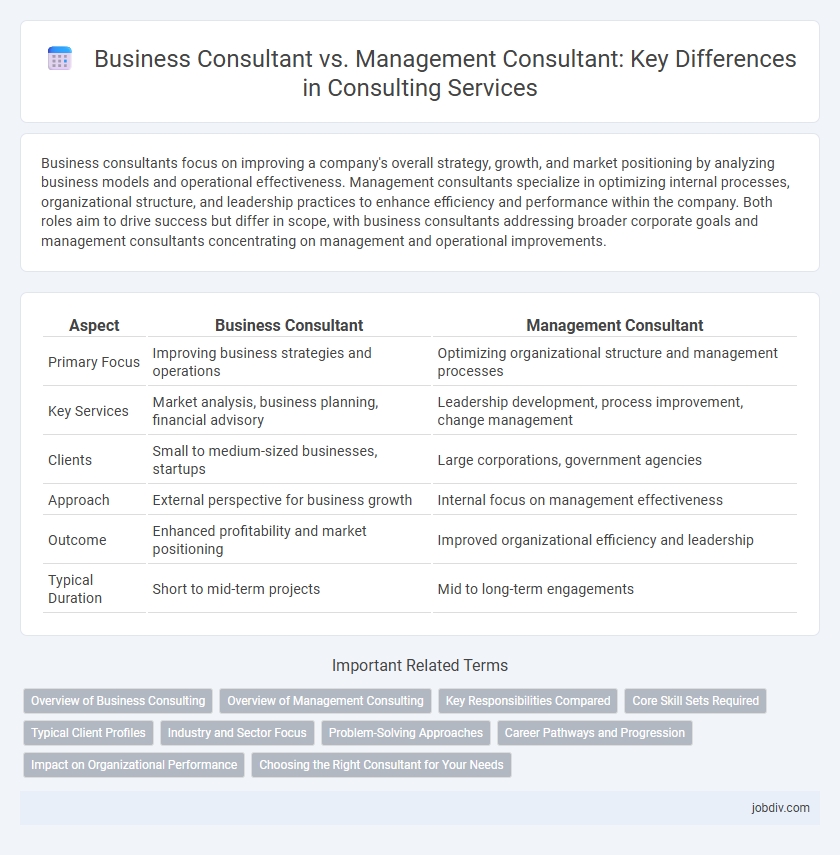Business consultants focus on improving a company's overall strategy, growth, and market positioning by analyzing business models and operational effectiveness. Management consultants specialize in optimizing internal processes, organizational structure, and leadership practices to enhance efficiency and performance within the company. Both roles aim to drive success but differ in scope, with business consultants addressing broader corporate goals and management consultants concentrating on management and operational improvements.
Table of Comparison
| Aspect | Business Consultant | Management Consultant |
|---|---|---|
| Primary Focus | Improving business strategies and operations | Optimizing organizational structure and management processes |
| Key Services | Market analysis, business planning, financial advisory | Leadership development, process improvement, change management |
| Clients | Small to medium-sized businesses, startups | Large corporations, government agencies |
| Approach | External perspective for business growth | Internal focus on management effectiveness |
| Outcome | Enhanced profitability and market positioning | Improved organizational efficiency and leadership |
| Typical Duration | Short to mid-term projects | Mid to long-term engagements |
Overview of Business Consulting
Business consulting primarily focuses on improving overall company performance by identifying growth opportunities, optimizing operational processes, and developing strategic plans. Business consultants analyze market trends, financial data, and competitive landscapes to provide actionable recommendations tailored to clients' unique business challenges. This field encompasses various specialties including marketing, finance, human resources, and organizational development, making it a broad and versatile area of consultancy.
Overview of Management Consulting
Management consulting focuses on improving organizational performance through strategic planning, operational efficiency, and change management. It involves analyzing business problems, developing actionable solutions, and guiding implementation across various industries. Business consultants may have a broader scope, but management consultants specialize in optimizing internal processes to drive growth and competitiveness.
Key Responsibilities Compared
Business consultants primarily analyze market trends, develop strategic plans, and optimize business processes to enhance overall company performance. Management consultants focus on improving organizational structure, operational efficiency, and leadership effectiveness through change management and resource allocation strategies. Both roles require strong analytical skills but differ in scope, with business consultants targeting external market opportunities and management consultants emphasizing internal management improvements.
Core Skill Sets Required
Business consultants specialize in market analysis, financial modeling, and strategic planning to drive company growth and competitive advantage. Management consultants focus on organizational behavior, process optimization, and change management to improve operational efficiency and leadership effectiveness. Both roles demand strong analytical abilities, communication skills, and problem-solving expertise tailored to their consulting domain.
Typical Client Profiles
Business consultants typically work with startups, small to medium-sized enterprises, and entrepreneurs seeking growth strategies, operational improvements, or market entry advice. Management consultants often engage with large corporations, government agencies, and multinational organizations aiming to optimize organizational structures, enhance executive decision-making, and drive large-scale transformation initiatives. Client profiles for business consultants prioritize agile and innovation-focused businesses, whereas management consultants focus on complex, hierarchical organizations requiring system-wide change.
Industry and Sector Focus
Business consultants specialize in improving overall organizational performance across various industries such as retail, healthcare, and finance by analyzing business processes and strategies. Management consultants focus more on advising corporate leadership within specific sectors like manufacturing, technology, or government agencies to enhance management practices, operational efficiency, and strategic planning. Both roles require deep industry expertise but differ in scope, with business consultants addressing broader business challenges and management consultants targeting leadership and operational improvements within defined sectors.
Problem-Solving Approaches
Business consultants analyze market trends and financial data to develop strategic solutions that enhance overall company performance, often focusing on growth opportunities and operational efficiency. Management consultants concentrate on organizational structure and internal processes, employing diagnostic tools like SWOT analysis and process mapping to resolve operational challenges. Both roles utilize problem-solving methodologies such as root cause analysis and data-driven decision-making, but business consultants emphasize external market dynamics while management consultants prioritize internal management effectiveness.
Career Pathways and Progression
Business consultants typically focus on improving overall company performance by analyzing market trends, financial data, and operational processes, leading to roles such as strategy analyst, senior consultant, and partner. Management consultants specialize in internal organizational structures and change management, progressing through titles like project manager, engagement manager, and principal consultant. Both career pathways demand strong problem-solving skills, but management consulting often requires deeper expertise in leadership and people management, influencing promotion and specialization opportunities.
Impact on Organizational Performance
Business consultants analyze market trends and customer insights to develop strategic plans that drive revenue growth and competitive advantage. Management consultants optimize internal processes, organizational structure, and leadership effectiveness to enhance operational efficiency and employee productivity. Both roles significantly impact organizational performance by aligning strategy with execution and fostering sustainable business improvements.
Choosing the Right Consultant for Your Needs
Business consultants specialize in improving overall company performance through market analysis, strategic planning, and operational efficiency, focusing on growth opportunities and competitive positioning. Management consultants concentrate on optimizing internal processes, organizational structure, and leadership strategies to enhance management effectiveness and solve complex business problems. Selecting the right consultant depends on your specific needs, whether it's broad business development or targeted management improvements.
Business Consultant vs Management Consultant Infographic

 jobdiv.com
jobdiv.com